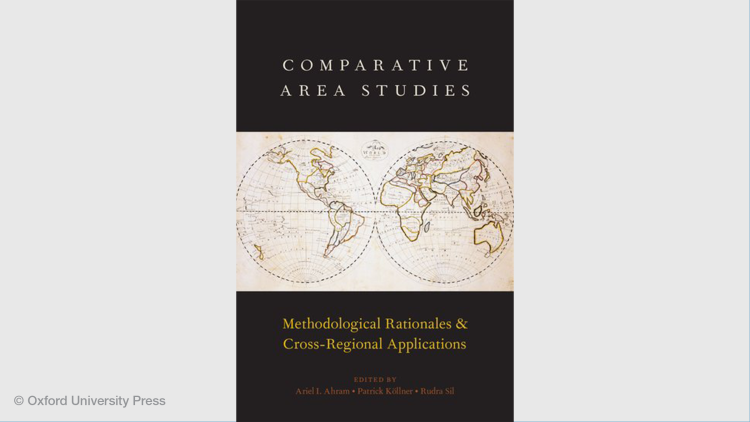
Comparative Area Studies
Comparative Area Studies (CAS) has experienced rapid development in recent years. Scholars have gone beyond their original area expertise in establishing new international networks. The goal? To gain new insights through comparison – for example, into the legitimacy of authoritarian regimes, the impact of economic crises, or the causes of violent conflict. The premise? Combining the context-sensitivity of Area Studies with comparative methods yields increased analytical leverage.
The GIGA first recognised the potential of this epistemological approach and its methodological implications many years ago. As one of Europe’s leading research institutes for Social Science-based Area Studies, the GIGA has since the turn of the new millennium firmly embraced CAS and given it an intellectual home.
Idea of CAS
The constitutive elements of CAS are strong context-sensitivity/expertise and the systematic taking of an explicitly comparative approach. CAS also benefits from a conscious use of the notion of “area,” i.e. an awareness of both the potentially variable geometry of areas and the well-founded criticism of certain traditional notions of spatiality.
The GIGA adheres to the following core definition here:
Comparative Area Studies (CAS) is a scholarly field of study that combines the context-sensitivity and knowledge of Area Studies with the explicit use of comparative methods as the appropriate means to generate both
contributions to broader disciplinary and theoretical debates, and
better insights into the cases.
Hence, CAS encompasses generalisation as well as specification. We believe that contextually informed and methodologically sound CAS scholarship benefits both the Social Sciences and area-specific studies. CAS can add value, inter alia, by
mutually enriching the theoretical and conceptual repertoires, analytical frameworks, and methodological toolboxes of the disciplines and area-specific studies in question,
uncovering whether both social phenomena and theories are geographically and/or culturally bound,
delimiting the scope of concepts by determining whether – and how far – these concepts can “travel,”
developing and forming new theories and concepts on the basis of comparative, context-sensitive evidence.
CAS can be seen as the missing link between globally generalising, cross-country studies on the one hand and individualising, empirically “thick” case studies on the other.
Forms of Comparison
Cross-regional comparisons
“Cross-regional studies involve the comparison of analytical units across different regions” (Basedau/Köllner 2006: 12). It is clear that the specific strength of the GIGA is to be capable of engaging in sound cross-regional comparisons, thanks to our matrix structure regarding Area Studies expertise. Cross-regional studies are demanding in terms of both field knowledge and methodological rigour. Cross-regional comparisons usually focus on the country level, but may also be carried out on the sectorial and subnational level.
Intra-regional comparisons
“Aspects or phenomena of different geographical entities within a given region are compared” (Basedau/Köllner 2006: 11). CAS can also be pursued within just one area. Intra-regional comparisons usually have the advantage that a number of background conditions pertaining to geography, climate, history, and culture are frequently broadly similar in nature. By using CAS-based approaches in individual areas the GIGA continues to reinforce its pioneering image, as the Institute continues to promote CAS-informed methods among Area Studies communities worldwide.
Inter-regional comparisons
“The idea behind such projects is usually to identify regional patterns and to compare them to each other” (Basedau/Köllner 2006: 11). Inter-regional comparisons serve mainly to describe and analyse similarities and differences in the paths, sequences, relevant-actor constellations, and outcomes of importance as regards global development (e.g. democratisation, constitutionalism, regional cooperation, and similar). The more the GIGA employs inter-regional comparisons, the greater the clarity with which the Institute will be able to delineate the contours of the different geographical areas it studies (note: what constitutes an “area” may strongly depend on the exact research question, and as such may not be congruent with the Africa, Asia, Latin America, Middle East distinction represented by the GIGA’s four Area Studies institutes).
Case studies
Additionally, the GIGA also conducts theory-driven single-case studies inspired by the CAS approach. There are different ways to undertake the qualitative analysis of a single-case study, as very much depending on the core objectives of the researcher. According to Sil (2025), a particular piece of research may be distinguished in terms of whether it is relatively more “nomothetic” (designed to abstract the essence from complex processes in order to build or test portable theoretical narratives) or “idiographic” (containing context-specific narratives with more emphasis on details). Case studies can also be seen through these lenses. CAS-informed case studies are located closer to the nomothetic end of the scale, as they are theoretically grounded ones that have been designed to illustrate causal theories or mechanisms. Enquiries conducted from this perspective can help determine, for instance, the most likely, the least likely, or the deviant case. Such studies are intrinsically comparative, and constitute an invaluable instrument for adding more confidence to a general explanatory theory. In contrast, idiographic approaches accentuate the specificity of the context to hand, a research strategy that precludes exporting to other cases any generalised causal relationships that may have been found in the initial instance. Every case study is a mixture of these different research approaches, but those situated in the broader context of comparable cases should be considered includable under the umbrella of CAS.
CAS at the GIGA
The GIGA’s institutional matrix, with its four Regional Institutes and four cross-cutting Research Programmes, is not only designed to enable scholars to pursue CAS in a sustained and systematic way but also implemented with sufficient flexibility to be tailored to each individual Research Programme.











